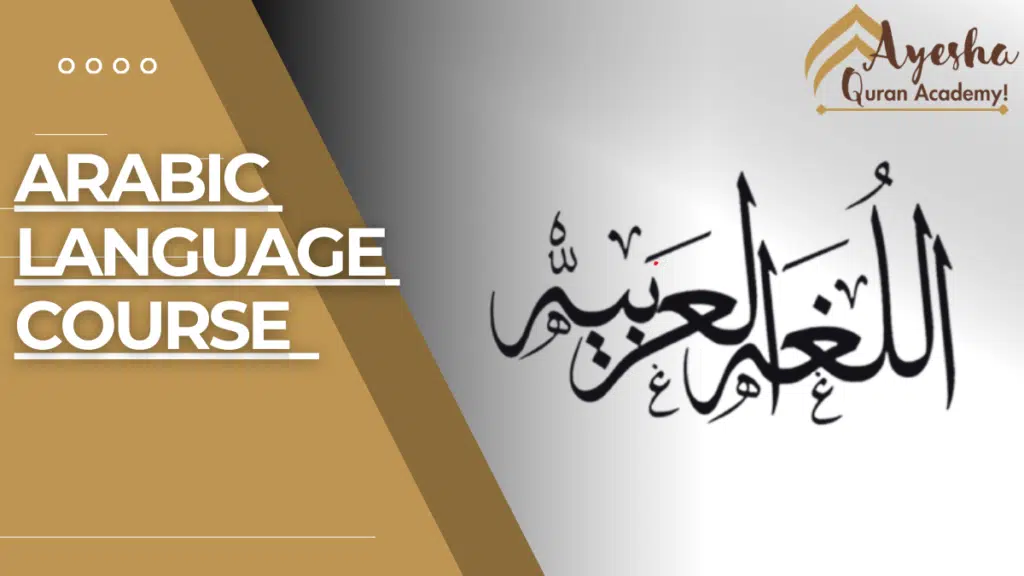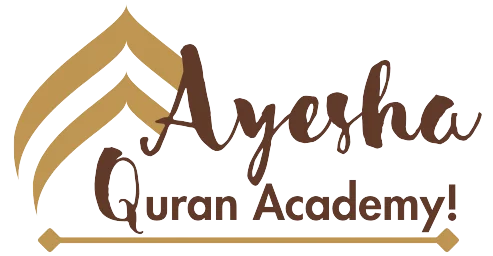Are you looking to learn Arabic online? Do you want to dive into the rich and diverse world of the Arabic language? If yes, then you’ve come to the right place.
Ayesha Quran Academy offers one of the best Arabic language courses available online. Whether you’re a beginner or looking to enhance your Arabic skills, Ayesha Quran Academy has got you covered.

Why Learn Arabic Language Course?
Arabic is a beautiful and rich language spoken by millions of people around the world. It’s the official language of over 20 countries and is the fifth most spoken language worldwide.
Learning Arabic can open up a world of opportunities, from understanding the rich Arab culture and history to enhancing your business prospects in the Arab world.
What Makes Ayesha Quran Academy Stand Out?
Ayesha Quran Academy is not just another online platform offering Arabic courses. It’s a comprehensive learning experience designed to make your Arabic learning journey as smooth and enjoyable as possible. Here’s why Ayesha Quran Academy stands out:
Comprehensive Course Structure
The Arabic Language Course at Ayesha Quran Academy is designed to cater to learners at all levels. Whether you’re just starting out or looking to enhance your Arabic skills, the course structure ensures that you get the most out of your learning experience.
Experienced Teachers
At Ayesha Quran Academy, you get to learn from some of the best teachers in the field. The academy boasts a team of experienced and dedicated teachers who are passionate about teaching and are committed to helping you achieve your learning goals.
Flexible Learning
With Ayesha Quran Academy, you can learn at your own pace and convenience. The academy offers flexible learning options, allowing you to choose the time and pace that suits you best.
Interactive Learning Experience
The academy believes in making learning an interactive and enjoyable experience. The courses are designed to be engaging and interactive, ensuring that you enjoy your learning journey.
Affordable Pricing
Ayesha Quran Academy believes in making quality education accessible to all. The academy offers its courses at affordable prices, ensuring that everyone can benefit from their quality education.
The Arabic Language Course Structure
Course Structure
The Arabic Language Course at Ayesha Quran Academy is meticulously designed to cater to learners of all levels. The course is divided into several modules, each focusing on a specific aspect of the Arabic language.
From the basics of the Arabic alphabet and grammar to advanced topics like Arabic literature and poetry, the course covers it all.
Learning Methodology
Ayesha Quran Academy believes in a holistic learning approach. The teaching methodology is a blend of traditional teaching methods and modern pedagogical techniques.
The use of multimedia resources, interactive exercises, and real-life examples make learning Arabic an engaging and enjoyable experience.
Course Content
The course content is comprehensive and up-to-date. It covers all aspects of the Arabic language including:
- Grammar: Understanding the structure of the Arabic language.
- Vocabulary: Building a strong vocabulary base.
- Pronunciation: Mastering the unique sounds of the Arabic language.
- Conversation: Developing fluency in everyday Arabic conversation.
- Reading and Writing: Enhancing reading and writing skills in Arabic.
Student Support
Ayesha Quran Academy provides robust student support. The teachers are always available to answer any queries and provide guidance.
The academy also offers additional resources like study materials, practice exercises, and feedback sessions to help students in their learning journey.
Course Duration and Schedule
The course duration and schedule are flexible, catering to the diverse needs of the learners. Whether you’re a working professional, a student, or a homemaker, you can choose a schedule that fits your lifestyle.
Student Testimonials and Success Stories
One of the best ways to gauge the effectiveness of a course is through the experiences of its students. Ayesha Quran Academy has numerous success stories and positive testimonials from students who have benefited from the Arabic Language Course.
Real-Life Experiences
Many students have shared how the course has helped them in their real-life experiences. Whether it’s being able to converse fluently with Arabic speakers during their travels or understanding Arabic literature and poetry, the students have found the course immensely beneficial.
Improved Career Prospects
Several students have also reported improved career prospects after completing the course. The ability to speak and understand Arabic has opened up new job opportunities for them in the Middle East and other parts of the world.
Personal Growth
Learning a new language is not just about career advancement or practical benefits. Many students have shared how learning Arabic has contributed to their personal growth.
It has broadened their horizons, helped them understand a different culture, and given them a new perspective on the world.
Benefits of Learning Arabic
Learning Arabic comes with a host of benefits. Here are a few:
Cultural Understanding
Arabic is the language of a rich and diverse culture. Learning Arabic can give you a deeper understanding of the Arab culture, history, and traditions.
Business Opportunities
The Arab world is a major player in global business. Knowing Arabic can open up numerous business opportunities in sectors like oil and gas, construction, finance, and more.
Travel
If you love to travel, knowing Arabic can enhance your travel experience in Arab countries. You’ll be able to communicate better and understand the local culture more deeply.
Personal Satisfaction
Learning a new language is a rewarding experience. It’s a great way to challenge yourself and achieve a sense of personal satisfaction.
Registration Process and Course Fees
Easy Registration
Registering for the Arabic Language Course at Ayesha Quran Academy is a straightforward process. You can register online by providing basic details such as your name, residential address, and contact information.
Upon receiving your registration request, the academy will get in touch with you to set up a time for your free trial class.
Course Fees
Ayesha Quran Academy believes in providing quality education at affordable prices. The course fees are competitively priced, making it accessible to everyone. The academy also offers flexible payment options, allowing you to choose a payment plan that suits your budget.
Free Trial Class
Before you commit to the course, Ayesha Quran Academy offers a free trial class. This allows you to experience the teaching methodology and course structure firsthand. It also gives you an opportunity to interact with the teachers and clarify any doubts you may have about the course.
Conclusion
The Arabic Language Course at Ayesha Quran Academy is a comprehensive and well-structured course designed to make your Arabic learning journey enjoyable and rewarding.
With its experienced teachers, interactive learning methodology, and affordable pricing, Ayesha Quran Academy is the perfect platform for anyone looking to learn Arabic online.
Yes, the Arabic Language Course at Ayesha Quran Academy is suitable for learners of all levels, including beginners. The course starts with the basics of the Arabic language and gradually progresses to more advanced topics.
The duration of the course depends on the learner’s pace and commitment. However, Ayesha Quran Academy offers flexible learning options, allowing you to choose a schedule that suits your lifestyle.
Yes, upon successful completion of the course, Ayesha Quran Academy provides a certificate of completion.
Ayesha Quran Academy provides a variety of resources for learning, including study materials, practice exercises, and interactive sessions with experienced teachers.
You can register for the course online by providing basic details such as your name, residential address, and contact information. Upon receiving your registration request, the academy will get in touch with you to set up a time for your free trial class.
Other Courses At Ayesha Quran Academy
Noorani Qaida Course
Quran Memorization Course Online
Quran Reading Course
Quran Translation Course
Online Tajweed Course
Arabic Language Course
Quran Tafseer Course Online

